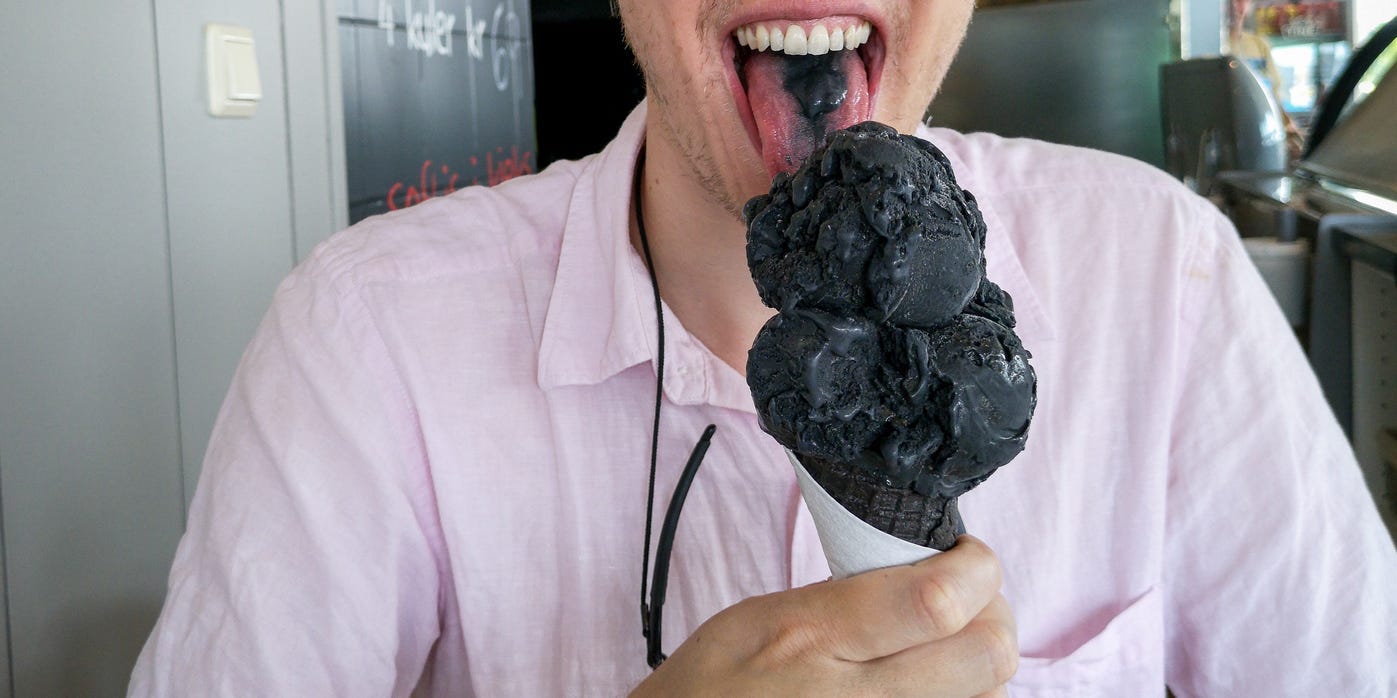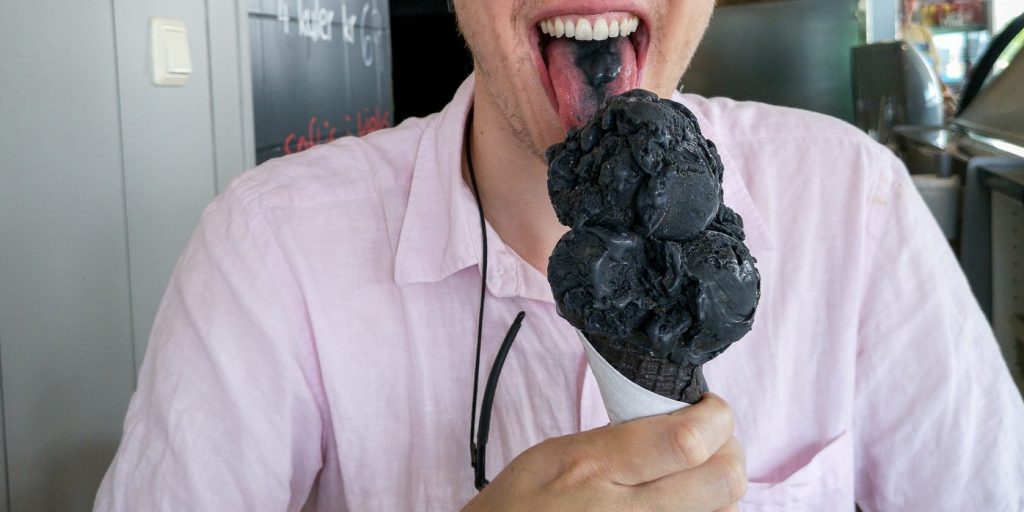
Morten Falch Sortland/Getty Images
- Activated charcoal has been exposed to chemicals that allow it to bind to certain substances.
- Many water filters contain activated charcoal because it can remove toxins from drinking water.
- But eating it could remove helpful vitamins from your body and decrease the efficacy of medications.
- Visit Insider's Health Reference library for more advice.
You may have heard anecdotal health claims about activated charcoal, a substance made by exposing charcoal to certain gasses or chemicals.
You can find activated charcoal in just about anything from toothpaste and skin creams to smoothies.
And while some say that activated charcoal can cure everything from high cholesterol to acne, many of these claims have no scientific proof. Moreover, taking activated charcoal without a doctor's advice can be risky.
What is activated charcoal?
Charcoal is made up of carbon molecules and the activation process increases their surface area, allowing them to bind to substances like water pollutants and certain drugs.
Once toxic substances are bound to the charcoal, your digestive system can't absorb them, meaning they can pass through your system without entering your bloodstream.
This means that activated charcoal can protect you from toxic materials in water, the air, and your body, but it isn't a cure-all.
Myths about activated charcoal
"There's a lot of confusion about what activated charcoal can and can't do," says Karen Ansel, MS, a registered dietician and author of Healing Superfoods for Anti-Aging.
Here are a few myths you may have heard, and why they don't hold up.
Myth # 1: It can detoxify your body
Hospitals often use activated charcoal to help flush out poisons or overdoses of medications from your body, but this doesn't mean it can work for everyday traces of toxic substances, says Ansel.
First of all, activated charcoal works best if you take it within an hour of being exposed to a poison, so to fight off all the toxic materials you come into contact with, you would
This means that drinking a single activated charcoal smoothie or even taking a daily supplement won't work as a regular detox method.
Second, activated charcoal may also remove important vitamins and minerals from your body. This can actually disrupt your body's own detox system, in which antioxidants like vitamin C and vitamin A help fight off harmful compounds like free radicals.
Myth #2: It can help with diarrhea
Activated charcoal may help with diarrhea, but only in very specific situations.
A small 2008 study of children undergoing chemotherapy found that 52% of children who got traditional chemotherapy experienced severe diarrhea, compared with 4.4% of children who received activated charcoal along with chemotherapy.
But there are no studies on activated charcoal as a remedy for other causes of diarrhea, and it may actually make you feel worse.
"Since diarrhea can be a side effect of activated charcoal I definitely wouldn't recommend it as a treatment," Ansel says. This is because charcoal can irritate your digestive tract and it's often sweetened with sorbitol, which acts as a laxative.
Myth #3: It can lower cholesterol
There have been very few studies on whether activated charcoal can lower cholesterol in humans, and the results have been conflicting:
A few small studies found that taking between 16 g and 32 g of activated charcoal for three weeks helped lower cholesterol -but experts warn that it is still under-researched.
Because activated charcoal hasn't been studied for long-term use, it's probably best to stick with a healthy diet to keep your cholesterol down, Ansel says.
"Or if your cholesterol is extremely high, talk to your doctor about cholesterol-lowering medication, such as a statin, which has a long, safe track record," says Ansel.
Benefits of activated charcoal
Though it isn't a cure-all, activated charcoal has some important health benefits that do have scientific backing. Some of the benefits include:
1. Treating overdoses or poisoning
If you end up in the emergency room with an overdose of medication or poisoning, there are some cases in which doctors may use activated charcoal to help the substances pass through your digestive system without being absorbed into your body.
A doctor may mix it with a sweetened liquid and ask you to drink it or give it through a tube that goes in your throat.
Activated charcoal doesn't work for all toxic substances, but it may help remove overdoses of:
- Acetaminophen (Tylenol)
- Aspirin
- Barbiturates
- Beta blockers
- Chloroquine or hydroxychloroquine
- Calcium channel blockers
- Carbamazepine (Tegretol)
- Methotrexate (Otrexup)
- Valproate (Depakote)
2. Reducing gas
There are a few studies that suggest activated charcoal can relieve gas, but more research is still needed. This may be because charcoal can trap gas molecules and help them pass out of your system.
One way researchers can measure excess intestinal gas is to scan patients' abdomen. How blurry the scan is can indicate how much intestinal gas is present:
- A small 2012 study of patients who took 448 mg of activated charcoal for two days before their scan, and 672 mg on the morning of the exam had much clearer scans of their organs, compared to their past scans.
- A similar 2020 study found that taking activated charcoal improved the clarity of scans by 63%.
However, if you just have occasional gas, "you'd be better off with a safer, proven method such as simethicone, the active ingredient in GasX," Ansel says.
And if your gas is chronic, it's best to visit a gastroenterologist to explore the root of the problem, says Ansel.
3. Filtering your water
Many popular water filters use activated charcoal, including the Brita and Berky filters. It works the same in water filters as it does in your body - by binding to toxic materials and filtering them out of your water.
Activated charcoal filters can remove:
- Chlorine
- Detergents
- Hydrogen sulfide
- Iodine
- Radon
- Some pesticides
- Volatile organic chemicals like paint thinners, cleaning products, and gasoline
However, activated charcoal won't remove certain contaminants like iron and nitrate, and you may need to use another type of filter for these substances.
Risks of activated charcoal
Sometimes activated charcoal is medically necessary, but taking it without instructions from a medical professional comes with possible risks:
- It can bind to and remove helpful nutrients like vitamins and minerals.
- It can bind to certain medications, such as antidepressants, antibiotics, or pain relievers, making them less effective.
- It can cause nausea and vomiting.
- It can reduce the effectiveness of birth control pills.
- In rare cases, it can slow down or block your intestinal tract which can lead to constipation or may even require surgery to clear your intestine.
Insider's takeaway
Activated charcoal can be a lifesaving treatment for poisoning or a great water filter, but it doesn't live up to a lot of the health benefit hype.
For instance, it isn't a good option for removing daily toxins from your body and it likely can't treat conditions like diarrhea or high cholesterol.
And it comes with some serious risks - "activated charcoal might sound like a miracle cure but there are so many downsides," Ansel says.
If you want to try using activated charcoal, always consult with your doctor and make sure that it won't interfere with any current medical treatments. If you think you've taken an overdose, always contact poison control at (800) 222-1222 to determine the best way to get treatment.
